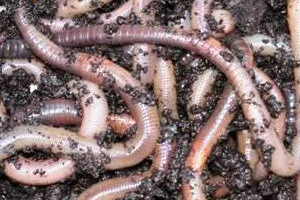Earthworms – an animal feed alternative

Using insects as an alternative to the conventional animal feed has been researched for quite some time now, ranging from flies to insect larvea, this new alternative could be the answer to the ever increasing price of animal feed. Now earthworms are being bred as an alternative feed source, and the waste is being seen as a rich fertilser. A win-win some would say.
Most farmers apply fertilisers and all kinds of manure such as human waste and animal urine on their farms to improve production. They also mulch as an agronomic practice to improve on productivity. Those engaged in dairy, poultry and fish farming use feed made out of varying mixtures that include bran, husks, stover and other matter.
However, this time around, they are being introduced to a technology of using earthworms to serve the same purpose. Scientists at Makerere University Agricultural Institute Kabonyolo (MUARIK) started rearing the earthworms under a programme known as management of manure for vermin compost, where they mix maize bran with food remains and cow dung with water as a bulk material for the worms to feed on.
Mr Charles Azizi Dara, a foreman in the machinery section at MUARIK, says the team started the rearing earthworms about a year ago. It was an initiative to address the challenge faced by poultry and fish farmers in purchasing feed at high price as well as to address the use of organic manure by farmers growing crops.
Earthworms take one month to mature but their life span is two years. They do not lay eggs but cocoons. These begin hatching once the cocoons are mature causing rapid multiplication of its generation.
Poultry and fish farmers can give their chicken and fish either live worms or they can harvest them and mix with other feeds such as milled fish, maize bran and husks for the same feeding process.
“Farmers can venture into earthworm rearing as a side business because the process is not labour-intensive and besides, farmers who grow crops and rear either chicken or fish can gain in both ways because the waste matter of these worms can be used as manure, which will result into high yields of the crops,” Dara said.
Nankinga suggests instead of farmers coming to the institute to purchase the worms as parent stock, they should become “outgrowers” to supply fellow farmers. This is because the worms can be harvested in swampy and moist places and as long as farmers have the interest in breeding them, they can also search for parent stock.
Source: Daily Monitor







